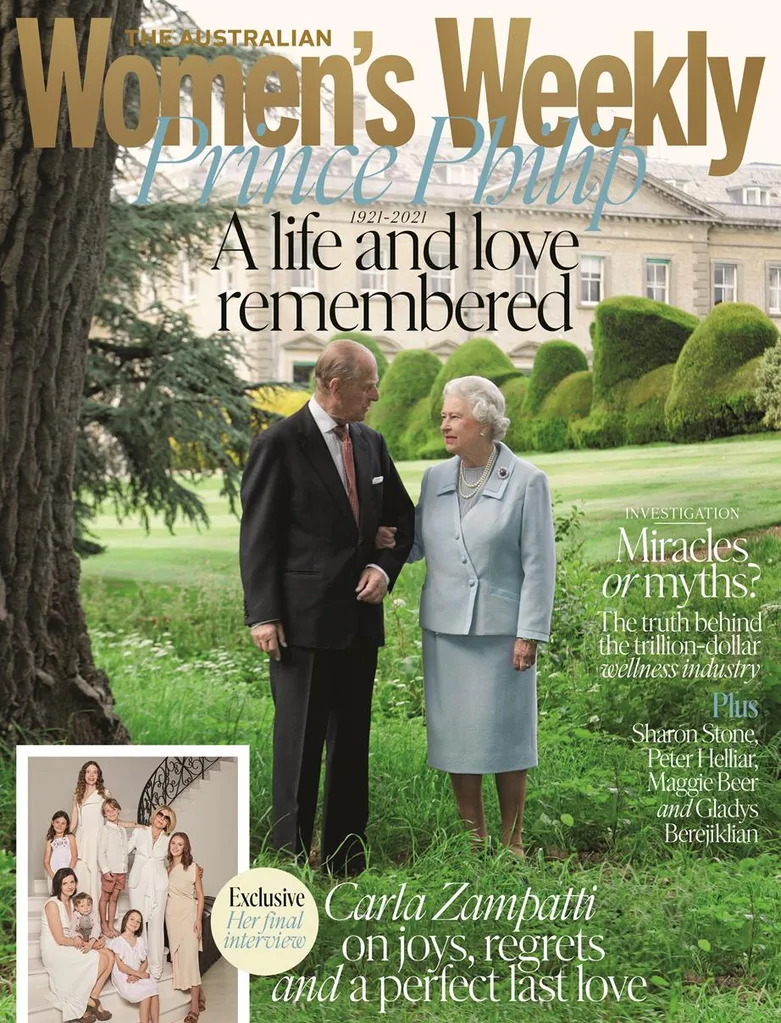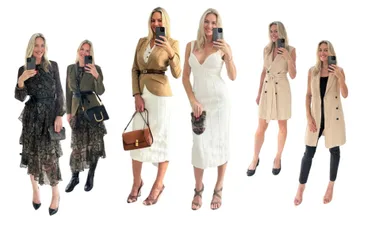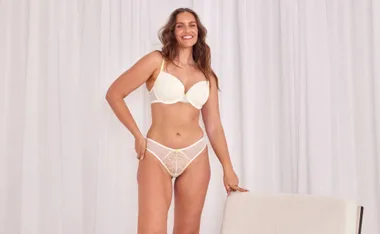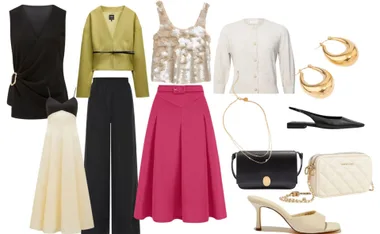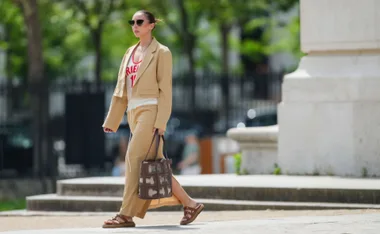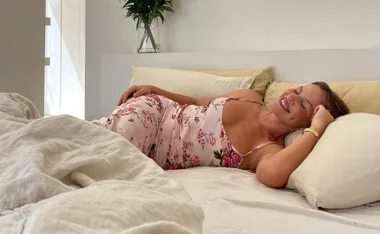As I write this, it’s hard to take in that the last words Carla Zampatti said to me were: “I can’t wait to see our story in the magazine this month”.
I was sitting two seats along from Carla at the opening night of Opera Australia’s La Traviata on Sydney Harbour. It was a beautiful balmy evening and we chattered happily about our joint love of Verdi, how thrilling it was to be out once more watching live opera and recollections of the wonderful day I had spent with The Weekly team at Carla’s home just before Christmas.
This story had been in the works for many months as I wrangled the busy timetables of Carla, her daughters and her grandchildren for what would be an unusually personal article about the importance of family to this icon of Aussie fashion.
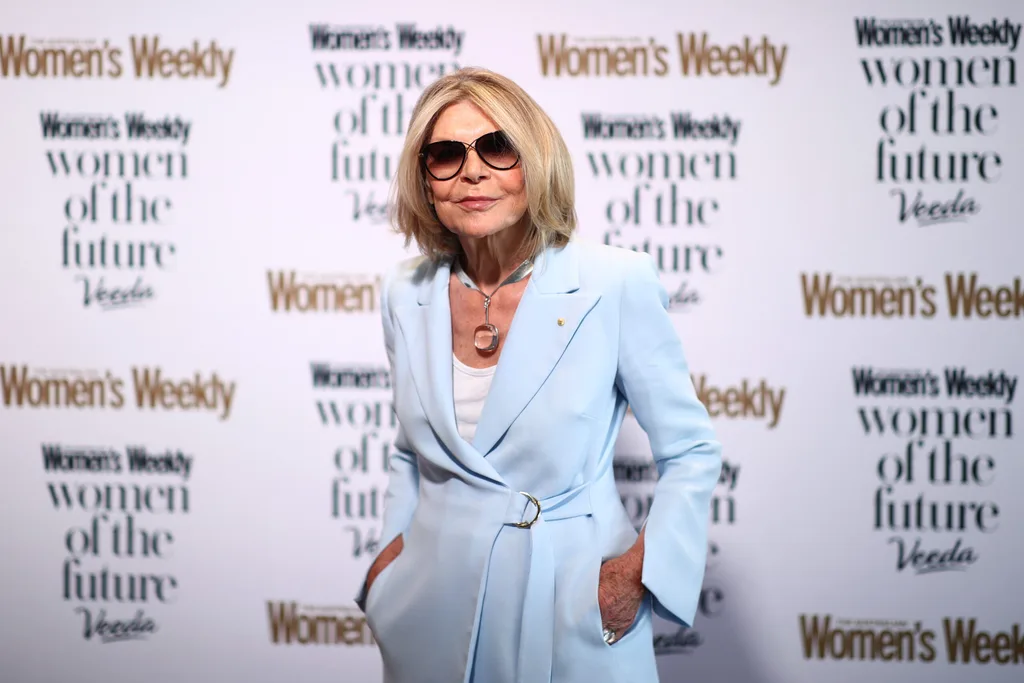
Carla Zampatti, 1942 – 2021.
(Getty)In what I will always treasure as a very special time, Carla, her daughters, Bianca and Allegra, and her eldest granddaughter, Brigid, shared halcyon memories from their childhoods and paid tribute to their mum and nonna, a role model to each in varying ways.
Carla talked candidly about growing up in Italy, migrating to Australia, her two marriages, and shared her feelings about an ongoing romance with a special partner that had started more than two years ago. She was excited about what lay ahead for her fashion business, refusing to even consider the idea of retiring because she had too much yet to do.
That story was always scheduled to run in this issue of The Weekly, coming out just weeks before what would have been Carla’s 79th birthday, and I feel a deep sadness that she won’t see it.
After La Traviata’s final curtain, Carla tripped on the steps while leaving the venue, and her death a week later shocked Australia, prompting an outpouring of tributes from celebrities, politicians and the thousands of women whose lives Carla touched.
Her state funeral on April 15 was testament to Carla’s standing in her adopted homeland. This is the last major interview and photo shoot with one of Australia’s most inspirational trailblazers, a proud feminist who paved the way for young women to follow their dreams.
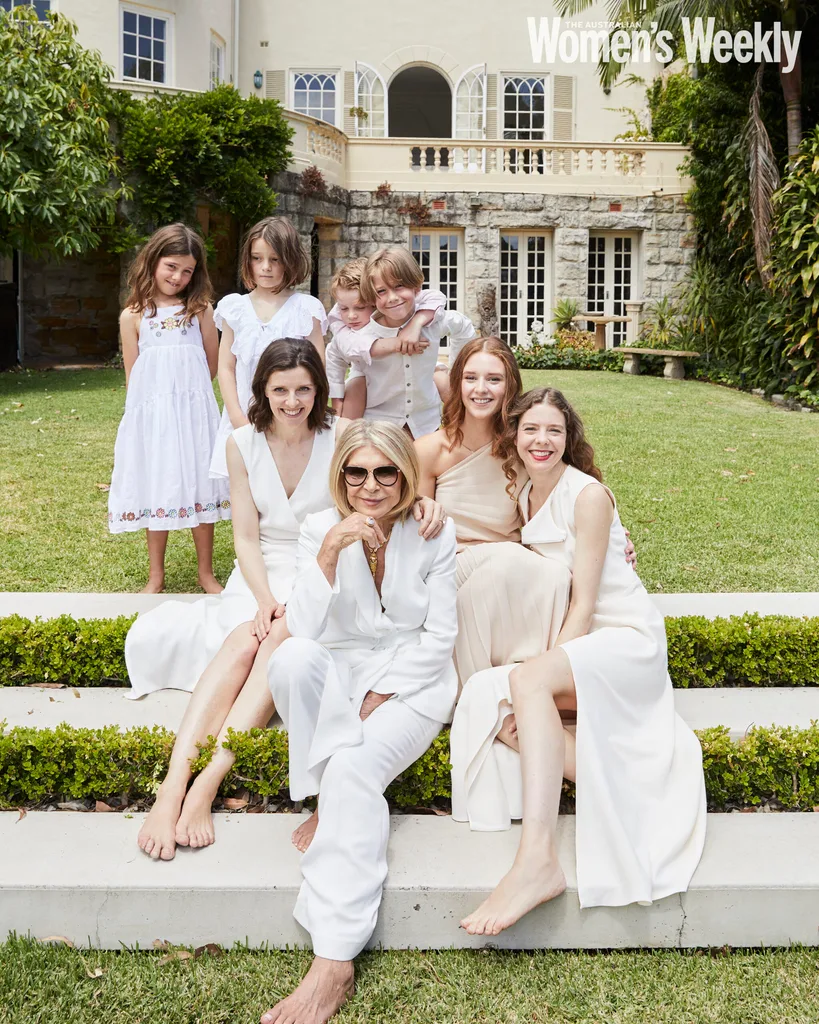
Carla with her daughters, Allegra (left) and Bianca (right), and her adoring grandchildren (from left): Arietta, Octavia, Rafferty, Florian and Brigid (second from right).
(Photographer: Corrie Bond. Stylist Mattie Cronan.)Italian soul
Carla Zampatti was born in northern Italy in the tiny village of Lovero and though she left for Australia aged nine, the nation of art, beauty, fashion and the Renaissance is deeply embedded in her soul. Her Sydney home could just as well be in Tuscany, filled with exquisite art and statuary and dominated by a stunning central curved staircase.
“I think your aesthetics develop early and mine are very much Italian,” she offers, her vowels still uniquely Italian.
As we talk, a caravan of Carla’s grandchildren – Arietta, eight, Octavia, seven, Florian, nine, and Rafferty, four – run in and out of our room. They have just chosen their – white – outfits for our shoot when youngest Rafferty sits down next to his nonna with a huge slice of watermelon in his hands.
“Oh gosh, you can just imagine what will happen to that shirt. I’ll have to wash it,” says Carla as Rafferty’s mum – Carla’s daughter Allegra – scoops him up.
Carla and Rafferty have a special connection, she tells me. He already has an Italian sense of style.
“Rafferty is aware of beauty. He asks me, ‘Why is this so pretty?’ … Already he has that aesthetic sense. Mine was always there too. I was very fussy about how my hair was done, what my mother put on me, the clothes I wore. I think it came from the Italian element because around you everyone – even kids – dressed up for Sunday best and they looked fantastic. I loved that.”
Carla was the only girl raised with two brothers, which she says was “a lot of fun”.
Despite her passion for clothes, she was a natural tomboy, spending her days climbing trees.
“I was the youngest of three, younger by seven and five years, and I grew up very much in love with my two older brothers, who looked after me because my mother was very busy running the family estate. I loved being with them and they were always kind to me.”
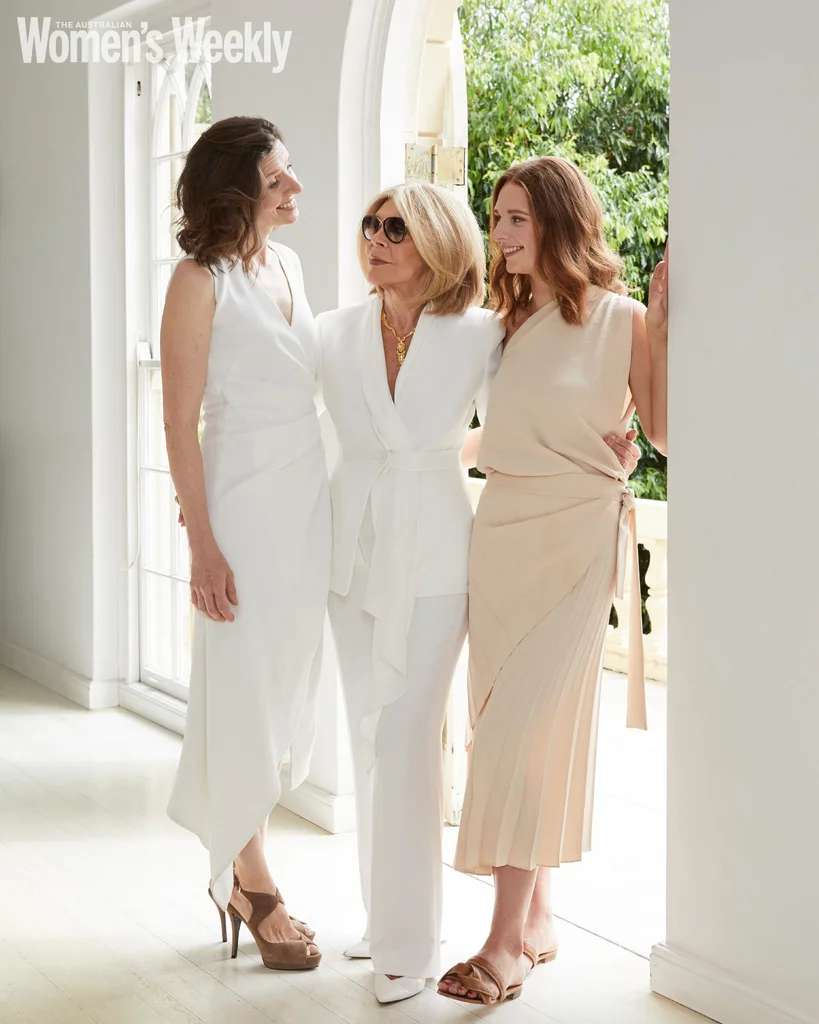
Carla and her daughter Allegra, and her granddaughter Brigid.
(Photographer: Corrie Bond. Stylist Mattie Cronan.)Carla’s main role model was her mother.
“My father was in Australia, having left just as the war broke out because he wanted to get away from fascism. He thought if he came to Australia we could all move, but then he was not able to come back and we were not able to come over until 1950,” she says.
“It must have been very hard for my mother because she had three kids and was running a huge family farm. From her, I learned that women had ability and could do anything they really decided to do.”
Carla recalls being five or six when she decided on her future life plan. It was a personal epiphany of sorts.
“I distinctly remember thinking, ‘When I grow up, I not only want to be a mother, but I also want to have some kind of business. I want to be working. I want my own identity’. That’s where feminism started creeping in for me. I thought to myself, ‘Women are really the soul and the heart of a family and yet they’re not given any credit. What they do is not seen as very important. So, when I grow up, I want to be more than a wife and mother – I want to have some kind of personal success’.”
That ideal became a driving passion as ideas about what her success might look like started to percolate.
“Creating beautiful clothes was very much in the back of my mind from an early age. Originally, I thought I’d be a good machinist – a dressmaker – and then when I came to Australia and realised that dressmaking wasn’t a business here, I decided I’d become a fashion designer,” she says.
In Australia, Carla finally got to know her father and the fireworks started. Like many men of his era, he was over-protective of this already fiercely independent daughter.
“I think my mother had built him up to be such a hero that he could never have lived up to that role,” Carla explains.
“I adored him, of course, but then he became very strict. He tried very hard to protect me, I think, from myself, he thought. He and I used to fight all the time.”
Path to success
Carla left school at 14 and moved from Western Australia to Sydney at 20 to forge her new life away from the family home. She knew exactly what she wanted to do. She gained experience working in the rag trade and soon realised she had a very saleable talent.
“At one point, I was working for someone who got me to redesign his collection of blouses, shirts, and his business went straight up, so it was then that I decided I’d go into my own business,” she recalls.
“I knew where to buy fabrics, I knew who to get to make them and I knew I didn’t want to be a dressmaker anymore. My vision, at the time, was to make beautiful clothes for women who could afford it, that were affordable. I’d been making clothes for myself over the years and people would stop me in the street and say, ‘Where did you get it?’. So I knew there was a demand.”
Carla was just 22 when she married businessman Leo Schuman, and while she didn’t think she was too young it was, she admits, a big mistake.
“All my friends were married by then. I thought I was going to be over the edge. So I did it, and immediately regretted it, but it was done,” she says with a sigh.
“I married the wrong person, but we were married for three years. He decided to invest in my business after seeing the success I was having. He would run the business and I worked from home designing, but that became a disaster because he kept telling me what to do, just like my father. I have an aversion to men telling me what to do. I decided I can’t stay married and I can’t stay in business with him, so I left the business and took my name – it was the only sensible thing I did – and started all over again with a nine-month-old baby.”
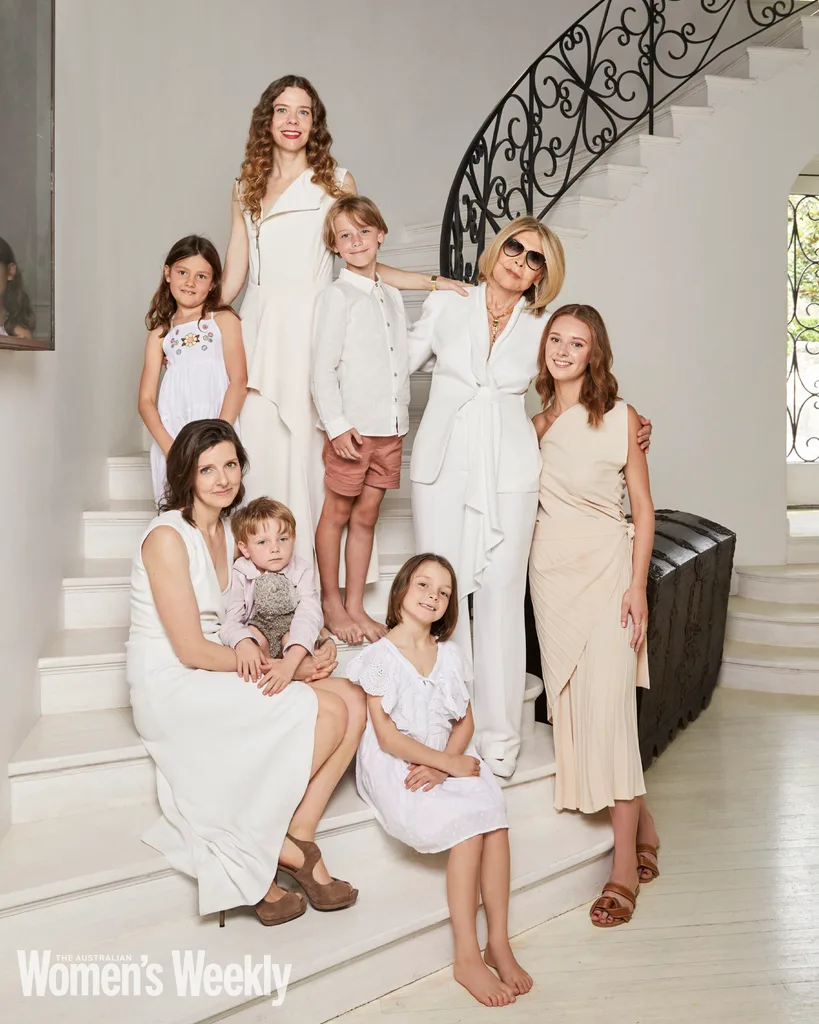
Allegra, Bianca and Brigid wear Bianca Spender. Carla wears Carla Zampatti. The children wear Seed and Cotton On Kids.
(Photographer: Corrie Bond. Stylist Mattie Cronan.)The baby was son Alexander, who today, age 51, is CEO of the Carla Zampatti empire.
“Having Alexander was part of deciding to leave. I knew that I didn’t want to bring up my son in that environment with my husband.” While Carla regretted the marriage, she says childbirth and motherhood were “divine”.
“I was in awe of going into hospital and seeing a human being come out of you. It’s an experience I would love every woman to have. Nothing else touches you quite as much. Alexander made me strong. Because of him, I was able to leave a really difficult situation and create a new life, which was wonderful,” she says.
But it wasn’t easy. Single mothers were frowned upon. “All I knew was that I wanted to create a safe environment for my son, and be happy and independent. I’m very fiercely independent,” she says.
When Carla hired a nanny to look after Alexander, she was shocked by the barrage of criticism.
“It was incredible. People would say, ‘How can you do this to your child, leaving him with other people?’ I even considered sending Alexander to my mother’s in Perth, but I had a dear psychiatrist friend who told me to talk to a child psychologist instead, and thank goodness I did. The psychologist was great. She said, ‘It’d be devastating for your baby to be sent off, don’t do it. Quality time is the thing – when you are with him, just have a lovely time, and leave it to somebody else to look after him when you’re too busy’.
“I worked unbelievably hard, but Alexander and I had a lovely relationship and we were together for seven years, day and night, because in the daytime he had a nanny and he went to kindergarten and school, and at night-time we were really close.”
Having left her marriage with no money from her business, Carla sought a loan from her bank manager who famously turned her down. “He said, ‘No, you’ll get married again. You won’t stick at it’,” she recalls.
Carla was furious, but refused to give up.
“I was fortunate – my cousin came along and lent me $5000. He said, ‘Pay it back when you can’. And I did eventually, with interest. He believed in me.”
Many times, she felt overwhelmed and exhausted. “I remember ringing a friend and saying, ‘I can’t do this’. He said, ‘Just write it all down and tick off one at a time; prioritise’. I did and I never looked back. I’m a very practical kind of person and I never overspend.”
As the business grew, Carla’s life expanded also and she met her second husband, barrister, politician and later diplomat, John Spender, at a friend’s party.
“We were very different people in many ways. He was very outgoing and I was very introverted. And from totally different backgrounds, but I think our basic values about family, people and friendships were similar. I started going out with him and it was up and down for five years and then we decided to get married.”
Family time
Their two daughters Bianca, now 44, and Allegra, 43, came along very quickly.
“John wanted a son and heir, and I can remember, particularly with Allegra, he was really upset,” Carla laughs. “But he absolutely adores his girls and the three children gelled together well.”
Alex was, of course, much older than his sisters and in many ways the girls saw him as another parent. “He was very much like a dad. I think, even to this day, they still regard him slightly in awe,” Carla says.
Their house at Palm Beach on Sydney’s northern beaches was for family time away from the bustle of the city.
“We used to spend three weeks of every year swimming, going to the beach late, just having gatherings,” Carla says.
“I believe in celebrating birthdays, so I always had a birthday party for everyone. Party being a lunch or a dinner, nothing too big, with one or two friends but essentially family. And we had Christmas Day lunches.”
Bianca has delicious memories of those times.
“I always knew our childhood was different from other people’s, but probably as I got older I realised how much,” she says.
“Mum didn’t speak Italian to us, we didn’t have any Italian relatives in Sydney, and so all of our references were Anglo-Saxon. But then when I lived in Italy for about six months, I realised there’s a whole country like her! If you want to understand Mum, you have to live in Italy. What that meant, growing up in an Italian way, was that family time was sacred. Mum and Dad worked very hard in the week, and on the weekend it was very much, ‘You need to be home to hang out with family, we need to have quality time’.
“There was also lots of contributing to the family. We were all cooking and making our lunches from the age of 10 and we’d go to work with Mum every holiday. If we didn’t have a play date with a friend, we’d go to her office and if we decided we really wanted to be home, we’d have a list of housework we had to do.”
Allegra says her mum was very loving and also very strict.
“She wanted us to take responsibility from a young age. We used to have rosters for making food. She really had us on a plan, partly because she was a working woman. Dad was involved as well, but he was a politician until I was about 12, so he was in Canberra five days a week and Mum really ran the house. He has a deep love of reading and books, and I think that had a massive influence on us as well.”
Allegra confesses that, as the youngest, she’d often “get away with things and have an easier run”, but everyone had a keen sense of Mum’s business.
“They were serving tea and running messages and filing from the age of seven or eight, simply because I couldn’t take them on holidays and the nanny used to get sick of them at home, so I’d take them to the office and they learned a lot,” Carla says.
All three children ended up working in the business at various times in their adult life, with Bianca taking up fashion design.
“At first she didn’t want to do it,” Carla says. “I think she didn’t want to follow in her mother’s footsteps. But I always knew she would be fabulous in fashion. She has good taste, a good personality and she’s attractive. If you don’t have good taste, you shouldn’t be in fashion.
“Allegra hated clothes and fashion for many years. She thought it was frivolous and useless. She quite likes it now, but she doesn’t regard it as important, as Bianca and I do. It’s not a crucial part of her life.”
Bianca, of course, went on to launch her own very successful eponymous label. She says her mother never pushed her into it, allowing her to find her own path, but was always on hand with advice.
“She’d say: ‘Now Bianca, would you really wear that? You have buckets of style, I don’t know why you made this thing. Think about how you feel in it?’ It was a real leveller. I think that’s why Mum’s clothes are so loved, because they’ve had to go through the Carla love test – wearing it, owning it and knowing this feels amazing.”
In 2010, Carla embarked on her second divorce, but unlike the first there was no acrimony.
“It was time to split. Sometimes marriages run out of puff. I think ours did,” she muses.
“We had a wonderful time together but, in the end, we were struggling. The children all supported me. We moved back into this house, which was a family home for 11 years, so it was all very familiar and easy. John kept in touch with them and they see him regularly.”
Allegra recalls a little sadness at the time. “Nobody wants their parents to get divorced, but on the other side of it they were both really happy.”
Bianca agrees. “They honestly had the best divorce ever. They’re two very independent souls and, at the time, I think we had the maturity to realise we’d been lucky enough to share the time together as a family, but the journey wasn’t one for evermore. It had been 35 years and this was going to be the best step for both of them. We used to laugh about it, but because Mum had been married before and Dad got married a month before he was 40, it made for a great break-up. There was no arguing, everything was really evenly shared. They had two boxes and put dots and two colours on everything and it was incredibly clear and amicable.”
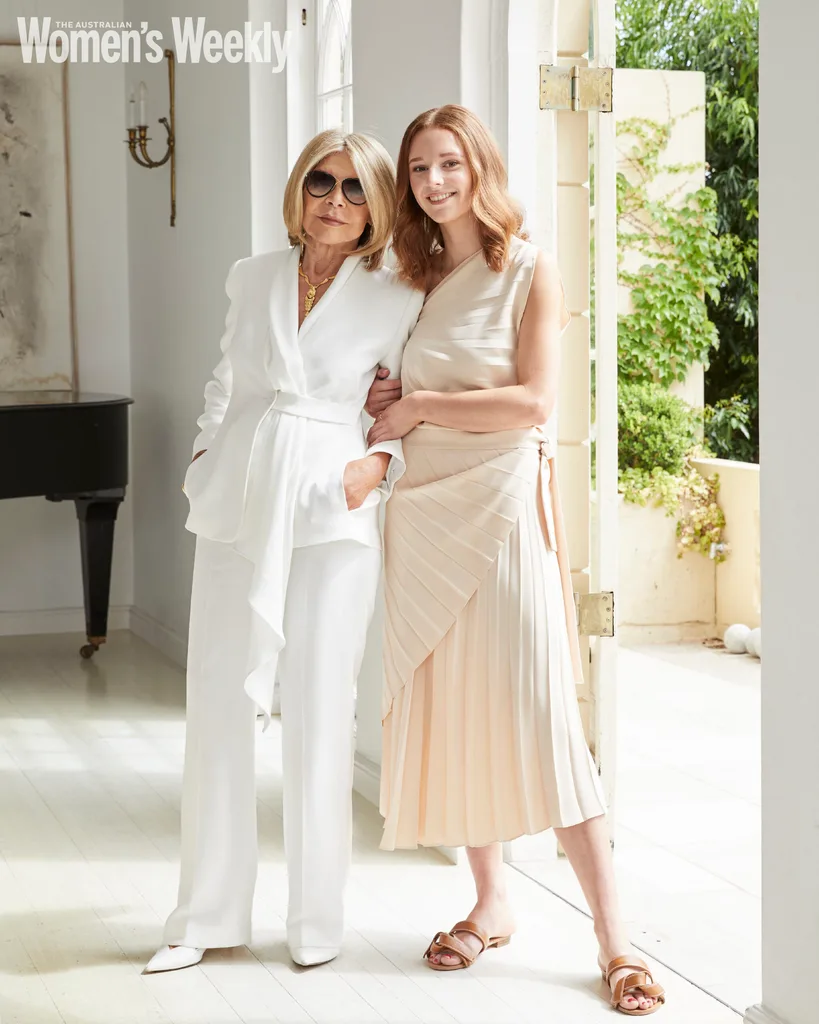
“Nonna has been a role model for me ever since I was a little kid,” granddaughter Brigid says.
(Photographer: Corrie Bond. Stylist Mattie Cronan.)Our Nonna
By this time, all three children were busy with their own families and Carla happily slipped into the nonna role.
“I think I was very lucky to have my mum when I had children,” says Bianca, who has two sons, Dominic and Florian.
0“I’m incredibly maternal. I always wanted kids. I called Allegra ‘my daughter’ even though she was just 18 months younger than me. So, for me, having wanted kids my whole life, I’d have been very challenged if I hadn’t had Mum as a parent.
“Owning your own business, there was no time for a real break. I had six weeks off for both kids, from the point of stopping work and going back to work. Mum showed me that you really can do what you love and be a great mum. I don’t think we ever question that of men, but we do of women.”
Carla says being Nonna to nine is wonderful. “Alexander has four, Bianca two, and Allegra decided to have a third, Rafferty, which I thought was a bit much considering how hard she works but he’s adorable. How could you resist? I think they’re much better at it than I was. They’re warmer, more cuddly. Yet they don’t reprimand their kids at all. That’s my only criticism – they spoil them.”
When pushed, Carla admits she does a bit of spoiling herself.
“I have a lolly jar,” she smiles. “I’m not a good babysitter because I never changed nappies. I had a nanny for 12 years and I’m still busily involved in my business. But they stay overnight and we wake up in the morning and they come in and it’s really lovely.”
Brigid, 20, is Alex’s eldest and was Carla’s first grandchild. She says: “Nonna has been a role model for me ever since I was a little kid. I have three brothers and I’m the only girl surrounded by boys, so it’s good to have her to look up to.”
Brigid has also loved working in Carla’s business since she was young.
“When it comes to work life, she’s taught me to just go for it – find whatever drives you and use that drive to become the best in whatever field you go into. Nonna’s definitely taught me to be independent, not having to rely or depend on anyone else for your own happiness or success,” she says.
1Carla’s success is not just in the beautiful clothes she creates that give women a powerful confidence, but the raft of accolades she has garnered, including a Companion of the Order of Australia and Australian Fashion Laureate. When I mention possible retirement, she waves me away. “My customers keep saying, ‘You can’t retire!’ and anyway I love it.”
For the past almost three years, Carla has had a new love in her life. She doesn’t want to name him, but says it’s a great match.
“He’s adoring and adorable. It’s nice to be adored at this old age.”
When I ask if a third marriage is in her sights, she declares: “No. Never. I think marriage is not such a good thing for me. I like my independence. I like my relationship with him as it is. It’s perfect. We don’t live in the same house. We see each other regularly and he’s charming and wonderful and spoils me. Why would I want to change that?”
Read more in the May issue of The Australian Women’s Weekly, on sale now.
